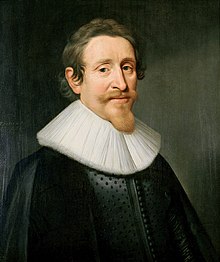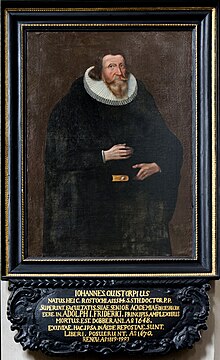Johann Quistorp the Elder
Johann Quistorp the Elder (born August 18, 1584 in Rostock ; † May 2, 1648 in Doberan ) was a theology professor and preacher in Rostock and eleven times rector of the university . He rendered important services to the city of Rostock during the Thirty Years' War .
Life
school
He was born the second of eight children to the white tanner Joachim (1556–1604) and Catharina Quistorp, née. Dumrath (1562-1647). At that time Mecklenburg's economic situation had deteriorated. After decades of Reformation, the religious conditions in the city of Rostock were finally determined by Lutherans . Johann Quistorp attended the large city school Rostock , organized according to Protestant principles, under the famous rectors Nathan Chyträus and Paul Tarnow . Even in his school days he was considered a hopeful student, in whom Chyträus and Tarnow “felt an excellent ingenuity”.
Academic education
After graduating from school, at the age of sixteen he moved to the grammar school at the Gray Monastery in Berlin. In 1604 he began to study philosophy in Frankfurt an der Oder , but had to return to Rostock in December 1604 because his father had died. Here he enrolled to study theology. On May 4, 1613 he received his master's degree, on May 14, 1613 he became a lecturer at the philosophical faculty. He then accompanied the patrician Nicolaus Ritter from Lübeck for two years on a trip through Holland , Brabant and Flanders as well as to Leipzig , Wittenberg , Jena , Marburg , Heidelberg , Tübingen , Cologne , Strasbourg and Basel . On May 21, 1614 he received the city professorship of theology from the Rostock council. After a tour of eight German universities, he took office in 1615. On October 8, 1615 he was elected rector for the first time. He held this office, which was elected for one year, eleven times. On April 30, 1616 he was elected archdeacon (second preacher) to St. Mary by the community. On October 3, 1616 he received his doctorate in theology. As was customary at the time, due to the extraordinarily high doctoral costs, he celebrated his wedding to Barbara Domann, the daughter of a wealthy Osnabrück lawyer and councilor, on the same day. The couple had two sons and eight daughters, including Johannes on February 3, 1624 , who was later called the younger .
Quistorp stood for election in 1627 for the post of pastor of the Jakobikirche , but at the insistence of the congregation, the deacon of the Petrikirche, Joachim Engelbrecht, was elected, who is particularly “good at talking”, but it was assumed that Quistorp's sermons were too uncomfortable and sharp for the congregation would be. This is supported by the fact that he was generally referred to as an “impressive preacher” and that there are a large number of printed and published collections of his sermons. In his time, Quistorp was considered a tolerant, peaceful theologian with an exemplary lifestyle.
In 1621 he settled a denominational dispute with the Calvinists , who emerged from the ranks of the academically educated lay people, with his balancing, convincing and mediating manner.
Thirty Years' War
In 1627 the Thirty Years War also reached Mecklenburg. Wallenstein occupied the country except for the cities. The Wallenstein occupation of Rostock began on October 26, 1628 under Colonel Ludwig von Hatzfeld. He was found murdered in his room on February 1, 1631. The crew was extremely excited, the angry soldiers threatened with a massacre. Fifty soldiers broke into Quistorp's house and demanded that he, as principal, hand over the guilty person without trial. Otherwise the houses of all university members would be ransacked and started with him. Quistorp managed to appease the military through his diplomacy. The murderer was the lawyer Jakob Varmeier , a member of the university. He gave godly reasons for the murder. He had become intoxicated with the idea of carrying out this act of liberation on the oppressor according to the biblical example. Varmeyer was extradited and died as a result of the torture. The city was spared a retaliatory strike.
Reforms
Quistorp made a significant contribution to founding the Prediger Widow's Fund and Freihäuser, so that the widows and orphans of the deceased pastors received a livelihood. He also made a special contribution to improving the school system, which had fallen into disrepair due to the war. So he reissued Luther's programmatic writing to the councilors to build schools, with a preface in which he vigorously advocated public schools and against private tuition. This resulted in new school regulations in 1647. He also arranged for the university to take measures against the harassment and exploitation of the younger generation by the older semesters in the "connections". He had already made this his concern in his rectorate speech and pushed it forward over the years. In 1643 he wrote a study instruction for theology students.
On October 7, 1645 he was elected pastor at St. Marien and appointed on October 24.
Thorner Religious Discussion
In 1645 the Thorner Religious Discussion, which has gone down in history, was convened. It was an ecumenical colloquium with theologians from the three major denominations to settle disputes between the denominations. The elector Friedrich Wilhelm, who had come to government in the Mark Brandenburg, requested the widely respected Quistorp from the Mecklenburg Duke Adolf Friedrich for the negotiations planned in Thorn. He refused, referring to his age and the rigors of the journey. The real reason for the rejection, however, was because he foresaw the denominational clashes between Orthodox Lutherans and the supporters of Georg Calixt . Instead, he expressed his unreserved trust as the leader of the Lutheran cause to Abraham Calov , an Orthodox Lutheran who was factually in agreement with him, and sent his son John as an observer. The negotiations ended with no results after three months.
Meeting with Grotius
Quistorp's encounter in 1645 with the theologian, natural scientist and lawyer, the famous founder of international law and forerunner of the Enlightenment Hugo Grotius, was important . Johann Quistorp provided this assistance when he died. Grotius had arrived in Rostock terminally ill after a trip from Stockholm. Quistorp later ensured that Grotius was temporarily buried in an honorable place in the Marienkirche before he was later transferred to his homeland.
On December 15, 1645 Quistorp took over the office of city superintendent.
death
Johann Quistorp died on May 2, 1648. He was with Duke Adolf Friedrich von Mecklenburg in Doberan to discuss the situation of the church with him. He died of an asthma attack that struck him at night in the house of the Doberan preacher who was hosting him. His body was solemnly brought back to Rostock and buried in the Marienkirche . His tombstone is set in the floor in the entrance area, and there are two portraits in the ambulatory and in the north aisle.
Works
- Oratio in qua schoristae academiarum pestes delineatur, Rostock 1621
- War sermons or declaration of the prophet Nahum, Darinn vuns the current troubled war system is brought before the eyes, Rostock 1628
- Quatuor novissima Or five and fifty sermons ... Besides ... sermons from the Pestilentz, Rostock 1629
- De spiritu sancto, Rostock 1635
- Disputatio theol. De fide infantum, quam Deo Patre per Jesum Christum virtute Spiritus Sancte juvante et gubernante, Rostock 1642
- De homooysia tum divinae christi naturae cum natura divina Patris: tum humanae Christi naturae cum nostra, opposita praecipue Ne-Arianis et Weigelianis, Rostock 1642
- De Mysterio Magno, unione scil.fidelium cum Deo, Rostock 1644
- Perpetual motion machine, never silent heart alarm clock or the needless doctrine of the ever-stirring conscience, Rostock 1646
- De sacra scriptura, Rostock 1648
literature
- Karl Ernst Hermann Krause : Quistorp, Johann . In: Allgemeine Deutsche Biographie (ADB). Volume 27, Duncker & Humblot, Leipzig 1888, pp. 51-53.
- Susanne Siebert: Quistorp, Johann (the elder). In: Biographisch-Bibliographisches Kirchenlexikon (BBKL). Volume 7, Bautz, Herzberg 1994, ISBN 3-88309-048-4 , Sp. 1135-1136.
Web links
- Digitized works by Johann Quistorp I in the Post-Reformation Digital Library (PRDL)
- Publications by and about Johann Quistorp the Elder in VD 17 .
- The Quistorp theologians of the 17th and 18th centuries (PDF file; 1.25 MB)
- Entry on Johann Quistorp the Elder in the Catalogus Professorum Rostochiensium
- Family of Quistorp
Individual evidence
- ^ Enrollment of Johann Quistorp d. Ä. in the Rostock matriculation portal
- ↑ Promotion to the Magister of Johann Quistorp the Elder. Ä. in the Rostock matriculation portal
- ^ Reception by Johann Quistorp the Elder. Ä. in the Rostock matriculation portal
- ^ Doctorate to doctorate from Johann Quistorp the Elder. Ä. in the Rostock matriculation portal
| personal data | |
|---|---|
| SURNAME | Quistorp, Johann the Elder |
| ALTERNATIVE NAMES | Johannes Quistorp the Elder |
| BRIEF DESCRIPTION | Lutheran theologian, rector of the University of Rostock |
| DATE OF BIRTH | August 18, 1584 |
| PLACE OF BIRTH | Rostock |
| DATE OF DEATH | May 2, 1648 |
| Place of death | Doberan |



